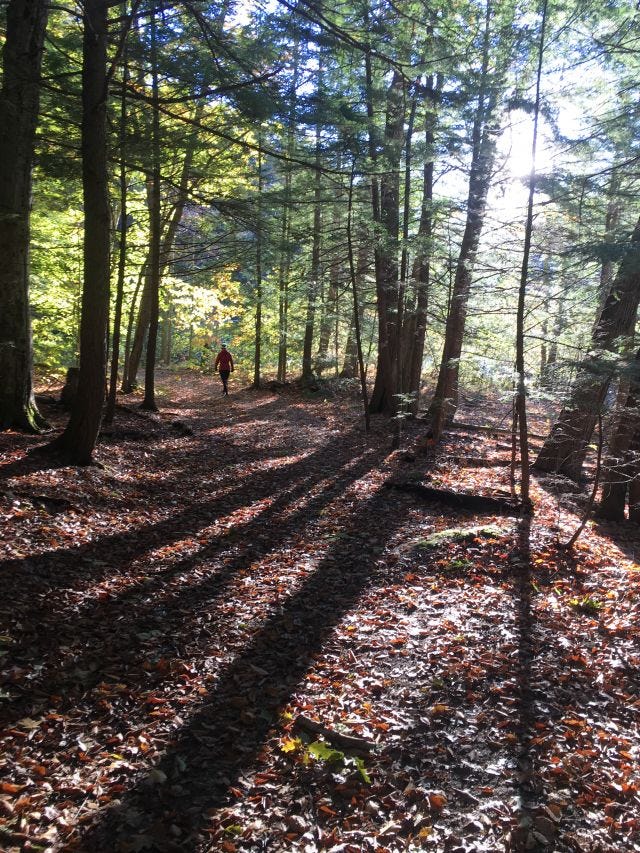RWL Newsletter #146 - cooking, printing, & intuition

Greetings from the University of New Hampshire! A couple of storms swept through Durham this week and it seems we have passed peak foliage. The leaves are covering lawns and piling up in corners. Fall is quite beautiful here in its many stages. My wife and I don’t spend a lot of time in the woods near our house in the summer because it gets quite buggy (deer flies are quite awful), but once we have the first freeze, the bugs retire and the woods are ours again. I’ll be putting the kayaks away soon and checking the oil in the snow blower and generator as we get a little closer to Thanksgiving.
On to the links!
Read
What: HumanProgress, Cooking: from Full-Time Job to Hobby
https://humanprogress.org/article.php?p=98
Why: “In 1890, 90 percent of American women baked their own bread...Today, baking bread is an amusement for foodies, rather than a necessary chore for all women.” This is a quick article in praise of progress. The amount of time and money we spend on food has plummeted in the last century. It wasn’t that long ago that simply acquiring enough food was a central concern to households. Now the average American household spends less than 10% of its income on food, and about half of that expenditure is on eating out, not home preparation (see my analysis from my $3 Diet project https://threedollardaydiet.blogspot.com/2013/12/food-expenditures-around-world.html ). I continue to be interested in food policy, and may eventually get back to it once the tenure process is over. It’s tragic that we live in a world of such abundance and there are still people who do not have enough to eat. However, while we should not forget those who are less fortunate, we should not lose sight of how much better things have become. Food used to be a major source of disease because it was scarce, now it is a major source of disease because it is plentiful.
Watch
What: CNBC, The first 3D-printed boat, 'built' by the world's largest 3D printer (2 min)
Why: I am fascinated by 3D printing. It captures my imagination because of its ability to manufacture objects that were not possible before. It also captures my imagination because of its ability to create rapid prototypes, like the boat shown in this video. In the video, they mention it would have taken them up to a year to build this boat - instead they were able to build it in a weekend using the printer. I’ve written before about 3D printing of organs, which is a rather remarkable healthcare possibility. I suspect the technology has a long way to go before it gets to mass-production for things like boats, but the individualized approach is just fine for organs. It will be interesting to see how this technology is ultimately integrated - and whether it remains in the realm of the one-off, or if it moves into mass production.
Listen
What: The Knowledge Project, Daniel Kahneman: Putting Your Intuition on Ice (66 minutes)
https://fs.blog/daniel-kahneman/
Why: I’ve only recently started listening to The Knowledge Project, but I really like what I’ve heard so far - diverse and interesting intellectuals talking in some depth about their work. This interview is with Daniel Kahneman, a Nobel Prize-winning psychologist whose best known work has to do with decision making biases we seem to be hard-wired with that cause us to make predictable mistakes. He had a recent book called “Thinking Fast and Slow” that was a bestseller. He did one of my favorite TED Talks on experience vs. memory, which I have shared here previously. Despite having spent a lifetime studying cognitive biases, he admits in this interview that he is just as likely to make the same decisions as anyone else, but his advice is to slow down decision making to try to overcome those biases.
Thanks for reading and see you next week! If you come across any interesting stories, won't you send them my way? I'd love to hear what you think of these suggestions, and I'd love to get suggestions from you. Feel free to drop me a line at mark.bonica@unh.edu , or you can tweet to me at @mbonica .
Also, if you find these links interesting, won’t you tell a friend? They can subscribe here: https://tinyletter.com/markbonica
Have a great weekend and do amazing things!
Mark
Mark J. Bonica, Ph.D., MBA, MS
Assistant Professor
Department of Health Management and Policy
University of New Hampshire
(603) 862-0598
mark.bonica@unh.edu
Health Leader Forge Podcast: http://healthleaderforge.org
"I know of no more encouraging fact than the unquestionable ability of man to elevate his life by a conscious endeavor." - Henry David Thoreau


